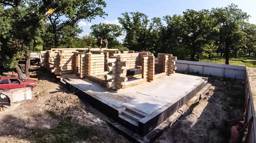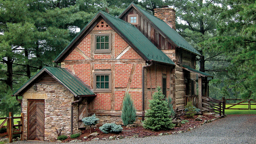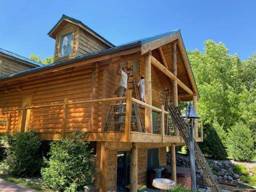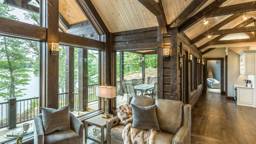

Without a builder, your log home is nothing more than a pile of materials and a pipe dream. You want to be sure to enlist the very best person for the job, but how do you decide who makes the cut? These 10 important points will guide you.
1. Seek Experience.
Experience is the most important attribute a contractor or builder can have, so ask the obvious but important questions: How long has he been in business? How many homes has he built and what type of homes were they? Log home proficiency is preferable, but a seasoned custom-home builder likely has the skillset necessary to tackle your log house. Most importantly, he will know what questions to ask your log provider to ensure he fully understands the scope of your build. A contractor whose bread and butter is lower-end spec houses, even if he’s built hundreds of them, may not be the person for you.
Also, seek out someone with the know-how to handle complex projects and who is a good problem solver. There are issues and modifications on every job site — yours will not be the exception — so you want a knowledgeable person with the ability to resolve snags fast and keep your build on budget.
2. Authenticate Licensing.
You’ll want to have proof that each builder you’re considering meets your state’s qualifications and has the credentials to build your home. This verification can’t be overstated, as many people assume all contractors are licensed, but all too often, they are not. Red flags range from the obvious (he won’t provide you with a copy of the license) to more subtle issues (he says you are responsible for pulling the building permit).
When you do get a builder’s license number, verify that it’s current with the office that oversees residential construction in your area (often you can do this online). An unscrupulous contractor may try to falsify or manipulate his license or provide you with documentation that’s expired. In the process, you’ll also learn if a builder has any violations on his record, which is different and much more serious than a “complaint.”
3. Verify Insurance.
Don’t just ask if a builder is insured; get proof of general liability and workman’s compensation insurance. Be sure to call the insurance agency to verify the policies are up to date. As with licensing, an unscrupulous builder may try to forge his documentation or provide you with an expired certificate that has been altered to look current. A quick phone call will give you peace of mind that your contractor is insured (and you are protected).
See also: 7 Tips for Insuring Your Log Home
4. Evaluate the Players.
From plumbers to stonemasons, the success of any custom home is a direct result of the players who will be handling the labor and materials — not just the person in charge.
Think of the people who will be working on your house as an orchestra and your contractor is the conductor. He may be the greatest conductor in the world, but for the music (aka, your house) to be beautiful, each individual member has to be talented with his instrument and know his part. Whether you choose a general contractor who relies on a steady group of subcontractors or a builder who directly employs his crew, it’s wise to ask each contractor candidate about the expertise of the people he works with.
5. Read Reviews Shrewdly.
In today’s market, nearly everybody starts a contractor search online. When evaluating builders, a positive reputation goes a long way, but beware of someone who is too perfect. If a builder has nothing but glowing online reviews, this could be a red flag that those comments were “plants,” (i.e., weren’t posted by actual clients.)
Keep in mind that in every builder’s career, he has had customers who he couldn’t make happy no matter how hard he tried. Or, the source of an unflattering review may be an unethical competitor looking to drive business his way. If you come across a negative review or two, don’t assume the builder is “bad” and dismiss him out of hand. Address the damaging comments head on. There are two sides to every story.
6. Consider Communication Methods
Good communication is essential in any relationship, and the one you will have with your builder will be no different. Every contractor has a preferred method of communication with clients, so it’s vital that you and he are on the same page.
For instance, if a builder relies heavily on texting but you prefer verbal phone calls, you may find communication with him to be frustrating. Likewise, some builders favor regular face-to-face meetings with their clients over emails. If your log home is in a different state from which you live currently, this form of communication expectation may be expensive or impossible.
Regardless of how you interact, if a contractor doesn’t take the time to explain his process, answer your questions or give you a cost estimate in a timely manner before you hire him, things are not going to improve after he’s on the job. Do be reasonable, however — it’s likely that yours isn’t the only project he’s handling.
7. Assess Contracts and Time Frames.
General contractors don’t work for free, and the way a prospective contractor sets up his fee structure may impact your decision.
Most contractors work on a cost-plus basis because many of the finishing materials that go into a custom log home aren’t selected at the front end of the agreement, and there’s a wide range of price points that could affect the bottom line. Plus, there could be administrative overhead, tool/equipment fees and other logistics that appear as line items on a contract. This is normal.
In addition to materials, equipment and services, the contract should spell out the timeline — particularly planned start and finish dates. Most contracts are for one year, but signing a contract on January 1 doesn’t mean you’ll be moving in by Christmas. Pay attention to the date that construction will actually begin, starting with breaking ground, but keep in mind that the schedule could be interrupted due to permitting holdups, bad weather or other delays out of your builder’s control.
It doesn’t hurt to have a lawyer review the contract so that you better understand how you are being charged and can protect your investment.
8. Inspect Their Job Sites.
It goes without saying that you should check out the workmanship of homes a contractor has built, but one area people neglect to inspect is the job site itself. How clean and organized is the site? Are the materials well cared for? Is trash or construction debris strewn about or has it been picked up and disposed of?
You may actually want to take a peek in the dumpster. Why? Everything that ends up in a job site dumpster, you will have paid for — period. So if the builder ordered 12-foot 2-by-4s, cut 4 feet off of them and threw the rest away, that’s essentially throwing your money away, too. There will always be some material waste, but if it’s excessive, that’s a red flag.
9. Assess Quality.
When it comes to quality control, most laypeople (aka, buyers) aren’t able to determine if the pluming lines or electrical wires are run according to code or if the floor or roof joists are nailed in properly. But by checking client references and asking a few key questions, you can begin to get a picture of the quality you will get from a prospective builder — both in terms of the structure and customer service.
Talk to clients whose log homes were built three to five years ago. Ask them how their houses have stood the test of time. Have their log walls have held up? Are the windows and doors still fully operational (an indication of proper settling)? Is the house comfortable and energy-efficient (a sign of good sealant application)?
In addition to structural quality, ask how the contractor supports his clients. Is the builder a good (and fast) problem solver? Does he fix any issues or late-construction defects in a timely fashion? Does he follow up with his clients months — even years — after construction was finished to ensure all is still right with the home? This type of personal attention is a key component of a top-notch builder.
10. Prioritize Pricing.
The first thing everyone wants to know is how much a builder is going to charge — and that should be the last point that factors into your decision.
If someone comes in with a much lower price than other bidders, that’s another red flag. Either some important aspect was forgotten or, worse, left out on purpose in hopes of winning the job.
On the contrary, a bid that’s on the higher side isn’t necessarily a warning sign. In this case, all the previous nine points we’ve made in this article come into play: If you find a contractor who has the experience and reputation; is licensed and properly insured; employs a talented crew and has a solid network of subcontractors; is a good problem solver; and maintains a clear and consistent line of communication with you — that person is going to be more expensive. He’s doing things the right way. And in terms of your experience throughout the process — not to mention your satisfaction with your completed log home — you’ll find he’s worth every penny.
See also: How Log Homes Are Sold











